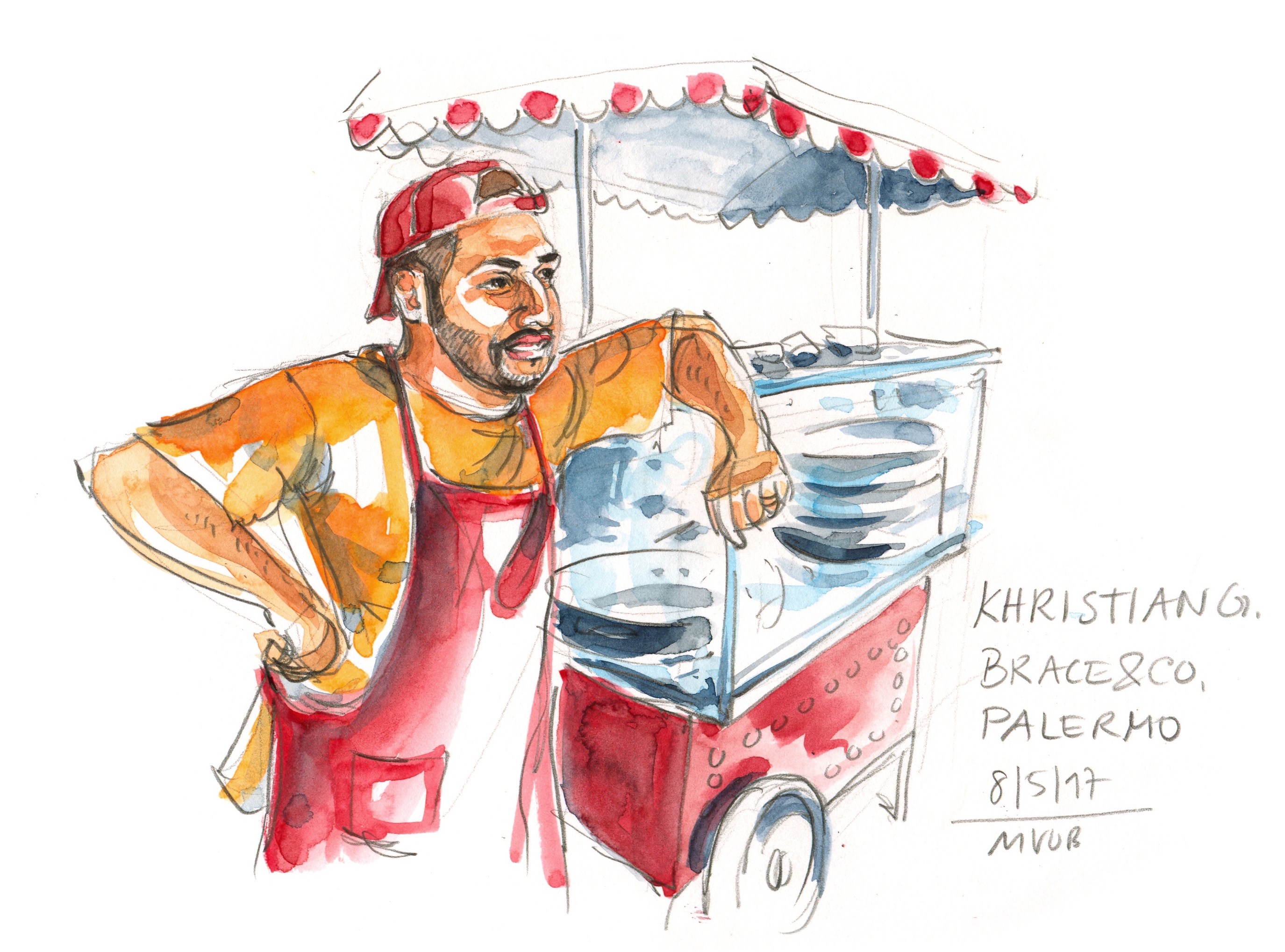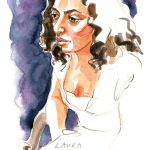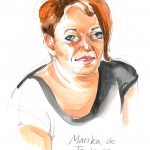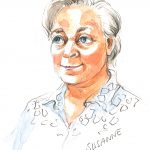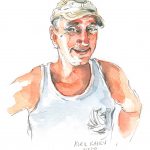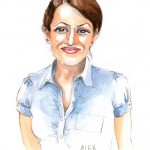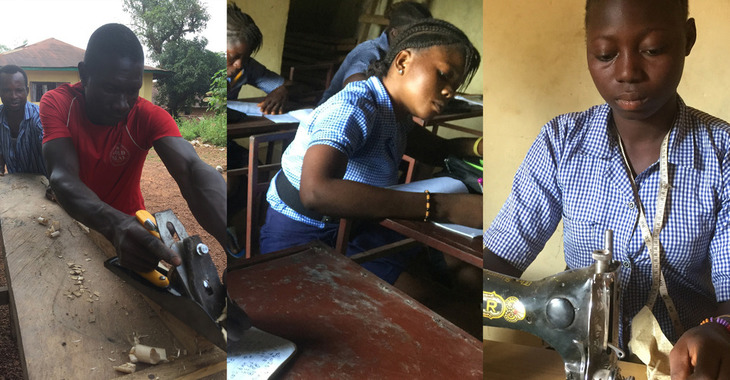Catania / Nîmes / Stockholm / Warna. The first thing that meets the eye when landing in the Sicilian town of Catania is an enormous pylon advertising “IKEA”. At our first stop at a “Panelleria“, a local roadside café on the road to Siracusa, we buy water bottled by “Nestlé”. Corporate Europe obviously works, not only for Swedish and Swiss mega firms. Yet, the question of what ordinary people think about their continent, the “European Union”, the “Euro”, arises. The young Italians who got on board our flight together with us in Hamburg obviously enjoyed their freedom of travel. They have never experienced barriers and customs officers at European borders.
The reason why these young Sicilians were originally drawn to Northern Europe springs to mind immediately. Leaving the airport of Catania via the the main road, we see derelict houses on both sides of the road, along with deserted orange groves and olive groves – Sicily is visibly poor. The unemployment rate is above 20 percent, nearly double the Italian average. In the province of Agrigento it is even worse, only one in four will find a job here.
This is exactly where we are heading. Leaving the UNESCO world heritage town Siracusa we get onto the motorway signposted to “Gela“ but ending abruptly in Rosolini. It’s another 100 kilometre to Gela, but obviously the money didn’t cover that. The idea of a road toll seems to have been abandoned after the toll booths had been constructed. Dandelions grow out of the tarmac where the toll was to be collected. So from here on we drive across country. There are fields as far as the eye can see, but the parcels are so small, that cultivating them cannot be profitable. So much land lies idle. This could be the result of misunderstood land succession, splitting the land to allow every sibling his own soil.
“Licate is home to the Mafia“, the Sicilians say, “not Palermo.“ No wonder – Licate seems like a mixture of Berlin-Neuköln, London-Barking and the Bronx in New York, the only difference being, that the poor here have their own Mediterranean beach. A white Mercedes with lowered suspension and Swiss number plates waits outside the bar we are having our Espresso at, but the driver is obviously Italian. We won’t ask him, if he is a Mafioso. Robert Saviano, the world renowned expert on Mafia wrote two years ago, that even the Mafia is making their escape from here “because there is no one to bleed any more”.
Agrigento has 60,000 inhabitants, but the population is falling. Coming to Agrigento the first impression is of a Greek, rather than an Italian town. On the outskirts lies “the valley of temples“ which really is a plateau, the antique town of Akragas, that has world heritage status since 1997. The temples of Hera and Heracles sit on the edge of this cliff as well as the nearly completely intact temple of Concordia, only missing its roof. We are staying only a few kilometres away, in the immediate vicinity of the “Scala die Turchi“ (the white Turc) with Gaetano and Gabriella, who also host two Austrians. Alexander and Maximilian both say they are thrilled by the island adding with a twinkle in their eyes, that “you can’t expect every part of Europe to look the same as home”.
Many things though are the same, wherever you go in Europe. For instance, if you want to know the gossip, you go to the hairdressers. Michele Scopelliti aged 78, has cut people’s hair for 72 years now, he says. No thought about giving up, his pension would not support him. That’s why he sent his sons to the North to earn money, one to Milano, the other even as far as Dublin. “We grant to Europe, that it’s so easy“, Michele says, “we are one big family. In Europe we are all equal and much stronger together. The common currency is making everything much easier, too.“ Asked what he thinks about the EU sceptics Michelle says, “they are looneys, you can’t take them seriously!“
The dry cut is followed by a wet shave, all inevitably accompanied by a chat about the ever-present current affairs, starting soccer and quickly leading to the refugees. Michele is not too concerned about the amount of refugees landing in their tiny unseaworthy boats in Lampedusa, only 200 kilometres away. What Michele is worried about is who will pay the cost for it all. He reckons, that the South will have to pay the bill for that. The money from Brussels was transferred to the government in Rome. There, they divided the funds equally to all the regions. So Turin can build bridges and Naples can invest in their museums, they don’t have to run rescue camps for refugees. In Sicily and Lampedusa almost all funds from the EU are used up to care for refugees. So, Michele reckons, it’s not an unfair EU that is the problem, but the Italian Government.
The financial Situation of the Sicilians is portrayed clearly the moment we pay: haircut and shave cost a mere 10 Euro, including tip.
At “Café Nobel“ (the “nobel“ sanitary facilities shall not be further mentioned here) we meet Sonia di Stefano aged 29, who was a refugee aid worker until recently, now she is without job – not because there aren’t any refugees any more, but because the local council has run out of money. Her partner is a lawyer who can’t find a job and passes his time doing unpaid work placements. They each live at home still, there is not enough money to have a place of their own, not to speak of the long anticipated wedding. Sonia is the best friend of Concetta Gazzitano from Raffadali, a village north of Agrigento. Concetta is the reason why we are here in Sicily – she is marrying Nicolò Foti from Palermo.
Bride and groom met at university/college, she became a nurse and he became a medical-technical radiology assistant. They would have liked to have stayed in Sicily, but didn’t find jobs. So together they dared to adventure north, to Germany. After a brief period in Mannheim they are now living and working in Itzehoe, a small town north of Hamburg. But one thing was always clear, a wedding would have to take place in Sicily. After the church ceremony in Raffadali everybody drives north to Caltanisetta for the reception. On this trip, we see the first big sign declaring that this is where the European Union invests in it’s future by financing a new stretch of motorway.
The wedding reception for 220 guests is held at a deluxe setting, the „Tiffany“ in immediate vicinity of the local refugee camp. The area of the restaurant is fenced in completely, surrounded by palm trees, white marble – there is al fresco cooking, live music and fireworks – everything just so. Astonishing probably only for us is the fact that instead of the anticipated glittering Italian ball, the night is spent eating – from 9pm to 2am starters outdoors – mains indoors – desert outdoors again.
We are searching for the “Pulse of Europe”, in the back of our minds the recent tendencies of “Brexit“ and the strengthening of nationalistic and fascist parties. “Pulse of Europe” is the name of a movement established in Frankfurt/Main (Germany) in 2016. The pro-European movement “Pulse of Europe“ is demonstrating for Europe across the continent ever since it’s foundation – this movement is very popular. A survey carried out by the “Bertelsmann Foundation” in 2015 shows that ”the majority of EU citizens support the EU and the Euro and would even like a stronger political and economical integration. Whereas being critical about the current politics of the Union.“
Arriving at our next destination, Palermo, this statement is confirmed. At a Milonga in the bar „Cuba Libre“ we meet Laura Menis from Cagliari/Sardegna. The 29 year old tango dancer was washed ashore the neighbouring Island five years ago. Finding a job meant only making a phone call, not a problem for the qualified fitness coach. She earns 1300 Euro / month and pays 450 Euro rent – “that’s alright to live on“, she states. The most important thing about the EU being the freedom to travel without any border controls, “even though I can’t afford it myself at the moment.“ Laura says that again and again she notices how far apart Europeans still are from each other, not talking geographically. „We have to get much closer, a true Union, a community getting stronger by uniting in economy and against terrorism.“ She sees the biggest draw back in the lack of communication because of language barriers. “A lot more should happen at school to change this!“ She reckons, her countrymen are the best example, hardly anyone speaks English. “The ability to speak to one another is the only way to become a ‚United States of Europe’“, she insists.
Laura has been dancing Tango for three months now, her friend Tatjana Yakovleva already for twice that amount of time. The 36 year old Tatjana, born in Königsberg – today’s Russian enclave Kaliningrad – has lived in Palermo for twelve years. Tatjana came to Palermo after falling in love with an Italian on a cruise ship, where she worked. Tatjana would prefer to live in Russia today, rather than Italy, but there is no way she could convince her daughter to come along. So she works as masseuse in Sicily and flies to her cold home twice a year. “I don’t care about the EU“, she says and pauses,“ but for my daughter this is really important, the freedom of travel and the common currency, being part of it.“
On the way to the airport we stop at “Brace & Co“ to have a traditional sandwich “panino con milza“ and get chatting to Christian, the 27 year old street cook, who has two children. Christian is a confessed follower of the fascist „Lega Nord“, of Le Pen and Putin. “Of course I know Merkel, but she is only good for Germany, not for Europe.” He thinks the biggest problem are the refugees, at the shop next door, a coloured man has taken away an Italian’s job as a street sweeper. “We have enough problems already and they are making it worse”, he says.
The newly weds Concetta and Nicolò Foti are also migrants. After their four week honeymoon on which they flew from Palermo via Rome to the US and to Mexico, they return to the northern German town of Itzehoe. “I have tried to find work in Sicily for two years”, says Nicolò, “but other than badly paid temporary work there was nothing to be found”. Germany on the contrary is urgently searching for skilled medical staff. Still the start in the new home was difficult. Apart from language problems, they had to find somewhere to live, sign contracts, get a bank account. “Bureaucracy is unbelievable in Germany!” But Concetta and Nicolò always found someone to help them along, Germans as well as Italians.
A European chain of retirement homes looking for international qualified staff for their German branch was their rescue. Concetta signed a job contract with them, that not only guaranteed fair pay but also a company sponsored language course. Nicolò went to adult education German classes and worked as a waiter at an Italian restaurant, where his strong accent matched the atmosphere, all the while looking for job placements in his field as radiology assistant. “I was often afraid”, admits the 29 year old, “now I’m not afraid any more.”
The job centre paid for Nicolò’s language course leading to level “B2”, which made all the difference. He is about to get a job contract with the local hospital. The tall Italian still doesn’t quite understand why a German would easily find employment in Italy, whereas the other way around it’s much more difficult. “I thought according to European law all qualifications would be equal.” In the beginning the disillusionment was very big, but now he and his wife are very happy in Germany. After spending his honeymoon in the US though, Nicolò became aware that there is a lack of unity in the European Union. “Someone getting a degree in Los Angeles can work in New York, why doesn’t that apply for someone getting a degree in Palermo and wanting to work in Itzehoe?”
Language is still the biggest problem for both of them. Thanks to her East-European colleagues, Concetta by now has a greater active vocabulary of Russian swearwords than Italian. Or German. Nicolò does not see an alternative to emigration. To him, the prospect for a future in Sicily is gloomy, especially for the children that he and Concetta are planning on having. Still Nicolò does not rule out going back to Sicily one day. He says: “We are very happy in Germany, but home is home and that for us is Sicily.”
Our next stop in search of the “Pulse of Europe” lies 1000 kilometres North-West of Sicily as the crow flies, an estate near the small town Sommières in southern France, near Nîmes. Here Marion von Oppeln, who is not only our draughtswoman but also a keen dancer, takes part in an international tango workshop. This time the journey is taken by train starting on the German “ICE” followed by the French “TGV Mèditerranée” from Strasbourg onward, planned journey time 17 hours. But after a few kilometres, not far past Hamburg, the journey comes to a halt … “people on the tracks”. After an hours wait it is clear, there is no chance of making any of our connecting trains. Though the English announcements of the train attendant are terribly provincial, his management of the crisis is unsurpassed, in no time whatsoever he books us into a hotel in Lyon for the night. His french colleagues being just as helpful, changing the ticket originally valid for the booked train only, into one for the following day. The fact that we speak fluent French no doubt wins us favours with the staff. But the following day we realise, that the entire train crew speaks German fluently.
Along the valley of the Rhône we eventually reach Nîmes, founded originally in 6th century B.C. by the Celts and conquered 120 B.C. by the Romans, it now is twinned with Frankfurt/Main, Braunschweig, Cordoba and Verona. We are immediately impressed by the cleanliness of this town. Nowhere in southern Europe have we come across such a tidiness. Because of our delayed arrival we have very little time to look at the sights, the Arena that has a great resemblance to the Roman Colosseum and the “Pont du Gard” being one of the most important constructions of Antiquity in Southern France. Half an hours drive away, the tango instructors Melina Sedo and Detlef Engel are awaiting our arrival. Together with our fellow course mates from Belgium, Switzerland, England and France.
The instructors, a couple based in Saarbrücken are fluent in German, French, English, Italian and Spanish. The course is held in English. Because of the high temperatures, above 30°C in the shade, the dance lessons are tough and interviews with the participants can only be held in the early morning by the pool. Jacky Lardy from Toulouse, who dances tango with his second wife, is one of the participants. The 57 year old French man is a university professor coaching PE teachers to be.
After a thoughtful silence Jacky answers our question to his view of Europe: “Europe for me stands for safety”. Especially the Germans and the French have killed each other century after century, the earth on both sides of the borders being drenched in blood. But since the founding of the European Union, the alliance between Berlin and Paris has become the most important in the European Union. “Europe has secured peace for more than 70 years now.” Our common history connects us, a fact that is very visible here in Nimes, where a lot of places have Roman or Germanic or even Hellenistic origins. From a mere practical viewpoint, the EU makes everything in daily life a lot easier, no changing of currencies and border controls because of the Euro and the Schengen Agreement.
Jacky thinks for long time, before answering, taking as much care formulating his answers as he does dancing. Asked what he personally gained from the European Union he names “Erasmus” and “Pisa”, the international exchange and evaluation programmes. “Through such programmes we can learn from other European states and optimize our educational system.” He wishes for a distinctly stronger Europe, especially economically. All European wars had economical reasons. Therefore, the financial and economical union today is invaluable, especially when taking US and Chinese competition into consideration. “I’d rather pay for an army of civil servants running the European Union, than sending battalions of young men into war, being killed in trench warfare as they were.”
After our interview, one hour and a half of dance lessons are awaiting us, getting changed for lunch followed by another three hours of dance instruction, getting changed and setting off for a “Milonga”, a tango dance night in Nîmes. We are lucky: this evening there is live music by a tango band named “Orquestra Tipica Tangarte” – coming from the Swedish town Malmö. Dance and music are international, they don’t need words.
Marika Bonen is responsible for the culinary creature comforts of of our tango class. The 39 year old cook is also from Toulouse. “The European Union is an economical union mostly and has been for a long time, even when it was still called EEC. But culturally it is not a union, it is diverse.” She says, that she doesn’t feel European, but rather French, if not “Toulousienne”. Nevertheless she spent six months of the previous year working as a cook in Sweden. “This was easy,”, she states, “but I don’t have any personal advantages from Europe.” Sometimes Europe seems to be taken completely for granted – Marika is already looking out for a new job for the coming year, she is looking Europe wide.
After five days, numerous dance moves and many new European acquaintances, we return to Hamburg, this journey running smoothly. Even though we have to change trains several times in France and in Germany, we arrive on schedule in Hamburg-Altona. Now we have to do our laundry and get the car filled up. The next location to measure the “European pulse” is the small town Täby, 20 kilometres north of Stockholm, where we want to celebrate the typical “Midsommar”-summer solstice with our Swedish friends. Like Marika Bonen said, Europe is a continent of regions and traditions.
The freedom of movement within the European Union as guaranteed in the “Schengen Agreement” of 1985 is being eroded more and more by nationalistic tendencies, also leading to a renaissance of boom barriers, which we encounter on our journey to Denmark. At the instigation of the right wing “Dansk Folkeparti”, a year and a half ago first police patrols were installed at the borders to Germany, which are now supported by Danish army reserves. We seem to make an inconspicuous impression and are waved through. The Slovak in front of us has to stop for inspection.
Denmark doesn’t take part in the common currency. Though we can pay for our coffee at the motorway café between Frederica and Odense in Euro, we get our change in Danish krone. We cross the two impressive bridges over the Storebaelt, paying the considerable toll fee of about 70 Euro, and reach Sweden experiencing a déjà-vu. Just as on our arrival in Catania we are greeted by an enormous pylon advertising “IKEA”. Here in the motherland of the “Billy”-shelf, this admittedly is not such a surprise.
Comparisons with Italy are made repeatedly during our week in Sweden: An Espresso in Palermo costs 80 Cents, in Stockholm three Euro, paid by credit card, cash is practically non.existant here. A new hair cut including a shave is ten Euro in Agrigento, in Vänersborg the hair cut is 15 Euro, no shave. Reinhold Schuch says, “Sweden is a little bit more pricey”. The 71 year old German originally comes from Heidelberg. After a few years in the United States, he came to the Swedish kingdom 30 years ago to hold the chair in physics at Stockholm University. We meet him and his Swedish wife Eva in a suburb of Stockholm, where undisturbed by drizzle and a mere 19°C, thirty people have gathered for open air tango, a “summer milonga”.
The German has never regretted his move to Sweden. “I would not want to return, Germany has become much too frantic, far too many people in too small an area.” He has kept his German passport nevertheless, owing to the Schengen agreement the residence permit is a simple matter, needing only a stamp from the police station every two years. Reinhold Schuch sees further advantages in the EU, he reckons that Sweden has become even more openminded, the range of goods wider and the prices comparatively cheaper. In addition there is the new elimination of the international roaming costs within the EU, making international phone calls cheaper. The open borders still is the greatest advantage of the EU, even if with regard to refugees, they have their disadvantages too. Schuch personally doesn’t see any problems here, but in the Swedish society the atmosphere is becoming more tense and the popularity of the fascist party “Sverigedemokraterna”, the “Swedish Democrats”, is growing, much to his concern.
The professor emeritus raises another concern: the North-South divide. “Since ‚Brexit‘ there are not so many countries left up North, together with Finland, Sweden is on the edge of the EU”, says Reinhold.
This matches the fears of Susanne Björkander : “We are often simply too nice!”, says the head of department at SIS the “Swedish Standard Institute”. Reading the newspaper daily and on her business trips she has noticed time and again how vehemently some EU members are trying to achieve their objectives, for instance Poland. “We have to find an equilibrium between what is good for Europe and what is good for Sweden. This can sometimes mean being more protective of our own economy.” She doesn’t fear the influence of the big EU nations Germany and France as much as the the many little eastern European states. Being the daughter of a Swedish mother and a German Jew, who fled from the Nazis to Sweden in 1942, the 64 year old knows well what the greatest benefit of the EU is – peace. “Too many people don´t remember what happened 70 years ago and are taking our peaceful Europe entirely for granted”, she says pensively in her terraced house in Täby, “in the 1930s people also didn’t realise, how easily such peace could be destroyed.”
Susanne’s husband Anders decided to actively do something to protect this peace and joined the army. The 61 year old major experienced Europe in his profession. He considers a European army, as is being discussed in Brussels at the moment, an illusion. “Every country has their skills and we need to combine them in a better way. That doesn’t mean, we have to fight shoulder to shoulder.” There is already a commander-in-chief of the joint forces, it is only that one country commissions the infantry and the other the artillery, he explains. Mixed teams would only make sense on a training mission like the one that is currently taking place in Mali. Anders points out, that without a close link to NATO, all European efforts would be futile. “We simply do not have enough troops!”
In her daily work Susanne makes sure that life is made easier for people in Europe by creating common standards. Especially in her field, information technology, there is tremendous work to be done. Cashless payment as practised in Sweden is just one of the subjects discussed in countless conferences across the continent. On the other hand the EU commission should not interfere with every bit of every day life of Europe’s around 745 million citizen. “Not every carrot in Europe should have to look the same, that’s nonsense!”. Instead, the EU bureaucrats should concern themselves with exchange programmes. “We need to get to know each other better through intermingling at work, in sport, at school and in the army.”
Celebrating together with friends is another good idea surely! That’s why we set off to the countryside together with Susanne and Anders, to join the “Midsommar” celebrations – in Nöttesta, south of Stockholm. We meet the artist Eva Melin and her husband Ragnar Thörblom, who speaks excellent German. Having been one of the great Swedish pioneers in public transport before retiring, he is also an honoured guest at partner companies in Germany. Today we are their guests in their beautiful designer timber house complete with studio. But first we all walk to the village sports ground.
From all directions people come flocking onto this field at the edge of the village, people on decorated tractors with a full load of passengers on the trailer, people on foot, by car, or even pushing a wheel barrow. The “Midsommar-Stang” is lying in the middle of the field, ready to be erected and is fixed safely into the ground with a few strong blows. It strongly resembles our German maypole. Before the dancing around the pole starts, raffle tickets have to be bought and an order has to be placed at the BBQ. The rest of the afternoon is spent with Eva and Ragnar eating many variations of “Matjes” (pickled herring) and drinking as many glasses of schnapps as drinking songs are sung. Only Anders sticks to his alcohol free beer, the Swedish law imposing a strict no alcohol policy for drivers.
We are surprised to awake without a headache the next day, and decide to go for a boat trip into the unique Stockholm Skerries before continuing our trip heading West. Hundreds of kilometres on the E18 and E20 run through nothing but woods until we reach the legendary Göta channel, where we take a break. Our stopover on the way home is called Vänersborg at the southern end of lake Vänern. Here, out of sheer necessity, once again we meet a hairdresser. His name is Mohamed Ali Karri, which doesn’t exactly sound Swedish, but the 28 year old carries a Swedish passport. He was born in Germany, in Winsen an der Luhe, South of Hamburg, his parents once came from Lebanon as refugees.
Mohamed Ali grew up in Germany and had reached 7th Grade at “Johann-Peter Eckermann Realschule” in Winsen, then the family was sent back to Lebanon in 2003. Before the fighting between the Hezbollah and Israel started again in Lebanon in 2006, the family packed their bags once more and fled, this time to Sweden. On the May 1st, 2006 they arrived in Vänersborg and have stayed until today. Mohamed Ali went back to school here and achieved his “High School Diploma” before he finished the hairdresser´s training he had started in Lebanon. Four years ago he opened his own business “Gentlemen’s Barber Shop” in Erdsgatan 23, “I’m very happy,” he says proudly, “we learnt the language, made friends and are well integrated.” In 2011 Mohamed Ali received his Swedish passport and is therefore an acknowledged European and feels one. “I’m much more European than Arab“ he states, “in my country of origin, I could not integrate as well.” Nevertheless, he does prefer Lebanese cuisine to European dishes and though being a Swedish citizen he follows the German national football league, thereby overcoming borders in several different respects. Asked what Europe means to him personally, he answers “safety” without hesitation.
Our hotel for the night is on the banks of the river Göta-Älv in “Restad-Park”, the site of a former psychiatric hospital. The grounds have been privatised and also hold one of Sweden’s largest refugee camps, housing about 1700 asylum seekers from all over the world. Right in front of the hotel terrace a park stretches with sports field and playground that are used extensively by very dark skinned children shepherded by women wearing veils. At the end of the third leg of our search for the “Pulse of Europe” we look at these people who have fled to Europe from war, starvation and despair, risking their lives and leaving behind everything they owned, and wonder what they are thinking about this continent. “Safety” is what Mohamed Ali immediately put forward as main incentive this afternoon. But how stable is this safety these days? As Susanne and Anders questioned just a few days ago? But they were not thinking about the much vaunted fear of being swamped by foreign influences, but worrying about estrangement between Europeans themselves.
After Southern, Western and Northern Europe, it’s time to look East. We start off again at the “Helmut-Schmidt-Airport” in Hamburg-Fuhlsbüttel, heading to Warna, Bulgaria. This time we are on board one of these charter flights that offer “cattle class”. Travel must be the most connecting thing in Europe, the question though is how people travel nowadays. In the 1950’s and 1960’s it was still an adventure for a German to travel to Italy for example, getting to know the Italian way of life. Today young people board charter planes to some popular tourist destination, sun, beach, sea, but foremost alcohol and sex is the means of recreation. At “Golden Sands” you can buy a T-shirt printed with “They say I was in Golden Sands – but I can’t remember” – holiday in a state of intoxication. The tour to the beautiful town of Nessebar is listed in the brochures, but the tour operators don’t really expect any interest in it.
Bulgaria has been a member of the European Union for exactly ten years now. In none of the destinations we visited, the pride of being part of the EU is as perceptible as here. The European flag is present everywhere – on arrival at the airport, on the shuttle bus, in front of every hotel. The flags are not here to only entertain the tourists though. The pedestrian zone in Warna has been rebuilt for around 13 million Lewa (about 7.5 million Euro), about 10 million Lewa coming from the EU. The gratitude for this can be seen on half a dozen signs placed in the magnificent new precinct. Some of the stinking diesel busses were substituted by trolley busses, and this is advertised on every bus. West of “Golden Sands” a nature trail was built in dense forest, complete with disabled accessibility, a prominent sign explaining the funding by the EU. Further afield, Brussels financed the renovation of a school, again advertised by a large sign. Even where the financing did not reach, the blue and golden stars flag flies, as on a remote sport ground with two wooden goals and grass badly in need of cutting.
Kiril Kanev is aged 68 and a taxi driver, still working because his monthly pension of 150 Euro would not get him very far. For 25 Euro he takes us from “Golden Sands” to Warna, happily also taking on the job as tour guide, he recommends the sea-park. With 350,000 inhabitants Warna is the third biggest Bulgarian town. He warns us not to change our money with the gypsies on the street. “They will give you forged money”, he warns. As we pass the town hall in his orange coloured Dacia estate, Kiril grumbles about the 32 percent tax they have to pay. “What do they do with all that money?”, he wonders. “They are all corrupt!”, he curses. The European Anti-Fraud Office (OLAF) agrees with him on this.
For 25 years Kiril has been driving tourists back and forth from “Golden Sands” to Warna, he speaks Russian, German and English fluently and a little Czech as well as a little Hungarian That covers his main clientele – 50 percent Russians, 30 percent Germans and the remaining 20 percent made up mostly of Scandinavians. Just as in Scandinavia, car headlights must be on during the day by law and summer houses are commonplace. All along the coastline new blocks of flats spring up like mushrooms and “To Rent” or “For Sale” billboards can be seen everywhere. Kiril tells us that mostly Russians buy these properties, starting from around 40,000 Euros.
The chatty taxi driver finds the EU a good thing, “They give us a lot of money for new roads, hospitals, universities”, he says ”and young people can finally travel. We have six universities now in Warna. You study here and then you can work anywhere in the EU”, he adds. His sons spend three months in the UK every year and “come back with good money in their pockets”.
There is a dire need for this kind of cash infusion. Going into remote areas in the country a horse and cart is no rare occurrence. In the country the ads on the buses bear witness to the fact that they have been retired from service in Germany and the “IFA” lorries are left overs from GDR-production. Bulgaria is poor. The GDP (gross domestic product) and the proportion of people living below the poverty line are at record levels, one extremely low, the other extremely high. Industrialisation has expanded noticeably since the collapse of the Eastern Bloc, but Bulgaria is still an agricultural country. We pass by innumerable sunflower fields, harvested cornfields, we see the odd apple orchard and some vineyards. Two things are obvious, Bulgaria is very green compared to Mediterranean countries and the size of the fields is enormous, very different from Sicily for example, undoubtedly a consequence of the former Soviet collective farming policy.
Tourism is the main source of income along the Black Sea Coast, especially at “Sunny Beach” and “Golden Sands”. Aleksandra Koleva earns her money in tourism, she is the receptionist at the “Bonita Beach” Hotel in “Golden Sands” north of Warna. The 23 year old has just qualified in international economic relations and is hoping to find a job with a multi-national corporation. In her eyes Europe is one big country that is divided into many small parts, each of which are unique. “And if we all work together, we can build a better Europe for all of us! Since Bulgaria became a member of the EU the situation in Bulgaria changed noticeably”, says Aleksandra, “the whole infrastructure, jobs and pay have improved.”
Working abroad is out of the question for the young woman. “I want to stay with my family and friends”, she says, ”abroad you are always a foreigner.” But she knows a lot of fellow students are thinking about moving to western Europe. “Many want to get away from here, because of the better options for earning money abroad. I don’t think it’s good that it has become so easy to leave. ”The 6th Warna Tango Marathon” helps dance away such serious thoughts. International DJs are putting on the music for a whole weekend of tango events on the beach, in the park and in the ballroom. The dancers mostly come from Bulgaria, but some from Bucharest (Romania) and Istanbul (Turkey) – as well as a small number from the rest of Europe. This time there is even one dancer from Hamburg in Germany. It is still a long road to success for tango in Bulgaria, but traditional dances are enormously popular, much more so than anywhere else in Europe.
Even at the party locations on “Golden Beach” traditional dancing is part of the show every evening, on an open air stage next to “Bierkönig” and near to the “Partystadl” and “Ballermann 6”, well known party bars. The same fate the popular Spanish holiday island Mallorca experienced a long time ago, where the Germans in Palma annexed a whole section of the beach and equipped it with sangria buckets and straws, is now also happening here. Julian, the barkeeper and Konstantin who works for a car rental company are both afraid of the sale of the country’s identity, and not only along the three kilometre stretch of “Golden Sands” beach. “Of course we need Europe and the European market for our economy – but at what price?” they wonder. A legend tells of 40 maidens throwing themselves into the sea at Cape Kaliakra in fear of the invading Ottomans. Some of the people that we talk to give the impression that today’s fears are not of neighbour’s weapons, but rather of their money.
Our journey ends with a sensational moonrise over the black sea, still a stifling 29° C. In the end, our 10,000 kilometre long journey in search of the “Pulse of Europe” takes us back to the beginning. When we arrive back home, we are told that Nicolò and Concetta are packing up. The German adventure of our Sicilian newly weds has come to an end. Concetta has found a job as nurse in Palermo and her spouse is following, audibly grinding his teeth. Nicolò would have had one more year of study in Germany, before being allowed to work as qualified medical technical radiology assistant (MTRA), but the call of family and roots was louder. His professional future is totally open again. “I probably won’t ever be able to work in my true profession.”
Elected politicians need to understand that it is more of a curse than a blessing to have a booming German national economy, that it causes a magnetic attraction especially to the eastern and southern border regions of the EU. As is necessary on a global scale, it is necessary on a European scale to make sure that there are not whole regions or countries that are economically neglected or even exploited. The supposed winners here are the ones having to foot the bill in the end, having to deal with economic refugees within Europe. If the crucial aim for Europe, peace, that everybody we met talked about, is to be achieved in the future, we need a fair cooperation and a comparable standard of living in all regions of the continent. Without economic equality, peace in Europe is at stake. When the “Pulse of Europe” ceases, the volcano will erupt and the dance will be over.
by Lars Bessel with drawings by Marion von Oppeln, Germany (Translation by Tordis Knees & Adrian Thatcher)
